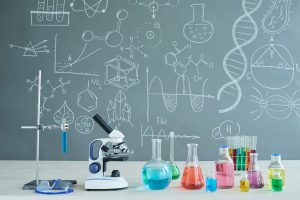
5 Traits of Highly Successful Science Students
In the second part of our Successful Student series, Mr. Nicholas Lang writes about how to be a successful science student. Nick is the Assistant Director of Subject Prep and Coordinator of High School Admissions Test Prep. He is also one of MEK’s most popular tutors!
Nick brings his compassionate spirit and his passion for the sciences, as well as his experience as a Bergen County Academies alumnus, to every student he teaches.
5 Traits of Highly Successful Science Students

Sciences are, in my opinion, the most exciting and fulfilling subjects you can learn in your high school years. They are something to be celebrated and understood together, so in preparation for a fantastic year in any science class (be it Chemistry, Physics, or Biology), you should keep in mind these 5 characteristics and tips that make a great science student.
Be objective-oriented!
When we read a prompt or an experiment, it’s especially important in the sciences to keep the bigger picture in mind. When we read an experiment, or consider a law or relationship, it’s always important to keep in mind the effect that we are testing for.
How does one variable affect another?
When we do different trials and adjust this constant, what changes as a result?
Identifying which variables we analyze and why can give a greater context as to the purpose of the experiment/trial in general.
Understand the connection between subjects!
Something that we see all the time within Chemistry, Biology, and Physics is that each lesson can be related to another. In Chemistry, we will always need Stoichiometry to understand Thermodynamics. In Physics, we will always need Kinematics to understand Energy Conservation.
This overlap exists not only within subjects, but also between subjects. Chemistry and Biology both address macromolecules, their structure, and their implication on cell processes. Chemistry and Physics both like to talk about Energy, energy transfer, and how heat can be exchanged between bodies.
If you have a global mindset for a given subject, you can contextualize lessons more than in any other discipline. Science stands out as the most interwoven.
Don’t be afraid to apply math!
No matter how you frame it, science and math go hand in hand. While we’re not necessarily sitting around applying exponent rules or simplifying expressions in a science class, we are very typically using math as a means to an end. To a moderate degree in Chemistry and Biology and an extreme degree in Physics, math will constantly be a tool for us to draw conclusions between two different conditions in material sciences. Don’t be afraid to jam some algebra! Math will seem scary in a science class, especially as we start to use more and more variables, but the math we do in science classes will always be easier than what you see in a math class.
Collaborate!

Science, even at the highest level, is a collaborative field. At its purest, scientists work together in incredibly narrow fields to draw conclusions with the help of each other’s work.
As Newton said, “If I have seen further, it is by standing on the shoulders of giants.” Don’t be afraid to reach out to others to work together! Understanding concepts is a collaborative effort between yourself, your teacher, and the students you are in class with. All science is done in teams. Form discussion groups, and work with each other to understand concepts and theories.
Think critically!
Arguably shared most by our friends in the English department, science students need to be critical thinkers above all else. Whereas Math is all objective fact, the sciences test our best ability to interpret the world around us: it is inherently more subjective of a subject. A good science student can look at results and draw conclusions about their implications for an experiment.
The process of science requires more human understanding than any other subject. A computer couldn’t create hypotheses and test them in order to form a conclusion. Your calculator can’t know what variables to test an experiment for. All of this is our job, to be able to dissect a situation and critically think about experiments and their purpose.
Next Steps
A large part of being a successful science student is rebuilding your understanding of what the subject is. While the sciences are often intimidating for many students, they are inherently very interconnected and collaborative. Understanding one concept will help you as you learn another—but this also mean that you need to have a strong foundation of concepts and science learning in order to be truly successful!
Feeling lost, or just want a little individualized guidance? Our expert academic counselors are ready to help you find your direction. Contact us today to speak with our counselors and start your path to academic success!
Our School Support Tutoring Program is also specially designed to not only build concept mastery, but also ensure that students build the mindset that they need for high achievement in the classroom. Fill out the following inquiry form if you would like to learn more about our Tutoring Programs and how to get started.
See you soon!



